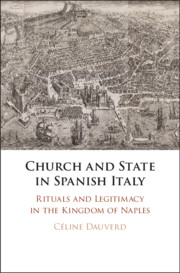Refine search
Actions for selected content:
3 results
11 - Inquisition, Holy Office, and the Congregation for the Doctrine of the Faith
- from Part II - The Roman Curia
-
-
- Book:
- The Cambridge History of the Papacy
- Published online:
- 28 February 2025
- Print publication:
- 20 March 2025, pp 282-315
-
- Chapter
- Export citation
1 - Iberian Antecedents
-
- Book:
- A Tale of Two Granadas
- Published online:
- 27 July 2023
- Print publication:
- 10 August 2023, pp 34-51
-
- Chapter
- Export citation

Church and State in Spanish Italy
- Rituals and Legitimacy in the Kingdom of Naples
-
- Published online:
- 09 March 2020
- Print publication:
- 26 March 2020
